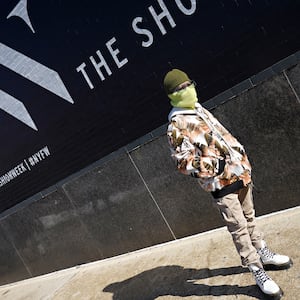After a year of virtual shows and trying to figure out the meaning of “phygital” events, New York Fashion Week is back to its pre-pandemic proportions come fall—and then some.
IMG, which runs New York Fashion Week: The Shows announced on Wednesday new changes that will affect the event, which is set to run in-person at Spring Studios from September 8 to 12.
A lot of money is at stake: as Leslie Russo, president of IMG’s fashion events and properties said at a press conference, NYFW generates around $900 million for the city every year when factoring in the tourism, local jobs, and tax revenue surge it provides. So it makes sense that for IMG—and New York in general—a successful comeback remains crucial.
ADVERTISEMENT
In an attempt to woo designers (many of whom have enjoyed the pace of digital events) back to the runway, IMG cooked up two initiatives. First: creating the IMG Fashion Alliance, which will provide 11 American designers with “investment, content, production and talent.” In return, the brands pledge to show at NYFW through 2022.
The class of designers are Sergio Hudson, who dressed Kamala Harris for inauguration night, Alexandra O’Neill of Markarian, who outfitted Jill Biden for the same event, plus Telfar Clemens, LaQuan Smith, Prabal Gurung, Jason Wu, Joseph Altuzarra, Monse, and Rodarte.
IMG also announced a brand new NYFW sponsor: Afterpay, a “pay later” service that enables shoppers to purchase products through four installments. The Australian tech company is only six years old, but it has already sponsored fashion weeks in its home country and London. (It has also been criticized for its late fees and the way it targets young shoppers.)
Practically, the pairing makes sense: Afterpay co-founder Nick Molnar said that the company has around 17 million users in the U.S. alone. “This announcement is about looking forward to the future in an incredible way,” Molnar, Australia’s youngest billionaire, gushed in a press conference.
Afterpay’s “mission,” Molnar added, is to “bring millions of consumers globally to shop from the best fashion labels and brands in the U.S.”
LaQuan Smith, the 32-year-old designer and New York native known for his sexy, fleshy, party-ready designs (and celebrity clientele like Jennifer Lopez and Kylie Jenner), will take part in a “see now, buy now” fashion show this fall in connection with Afterpay. Anyone watching the runway—in-person or online—can shop it, automatically.
After a devastating year, it makes sense that designers need to bounce back however they can. Such partnerships do promote emerging names, and are the price of doing business these days, even for creatives.
But as NYFW becomes more about catering to the “consumer” rather than presenting a preview of future seasons, how is it different than a trade show or convention?
The relevance of NYFW has long been debated. When anyone with an Instagram account can immediately see what’s on the runway, rather than waiting months to view it in a magazine spread, has the event been democratized, or cheapened?
It is an admittedly elitist perspective. A more urgent dilemma NYFW must face, and has failed to do so in a meaningful way: for all of its talk of sustainable practices, what is more wasteful than a biannual selling spree?
“We all want designers like LaQuan Smith to win. We want to support and make sure he gets his coin,” said José Criales-Unzueta, a fashion writer and designer. “So that’s good if it helps the brand.”
But in terms of “optics,” Criales-Unzueta says, Afterpay’s name under NYFW “does not help” the institution.
“There is a popular opinion within fashion circles that NYFW is all about merchandise, all about pushing product out, and is very commercial,” he added. “It doesn’t match up to the same level as London, Paris, or Milan, you don’t have those names like Gucci, Fendi, or Prada who bring up a certain level of buzz. We know fashion people tend to be snobbish in that sense.”
Criales-Unzueta wonders if the Afterpay association gives “an added layer of that commercial approach” that could “turn off certain editors, stylists, and influencers who bring clout to the shows.”
But post-pandemic, clout is not exactly the currency NYFW and IMG need—it’s time for the real thing, actual money. And with so many fashion people engaged in transactional relationships with labels where they borrow or request certain clothes, it might be time for those at home to pick up some spending slack. That certainly seems to be the goal.






